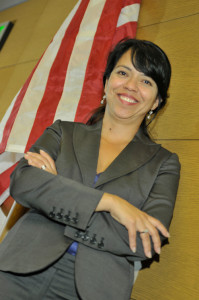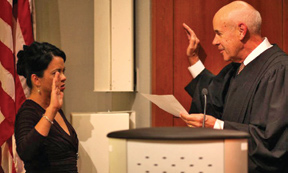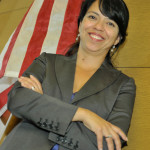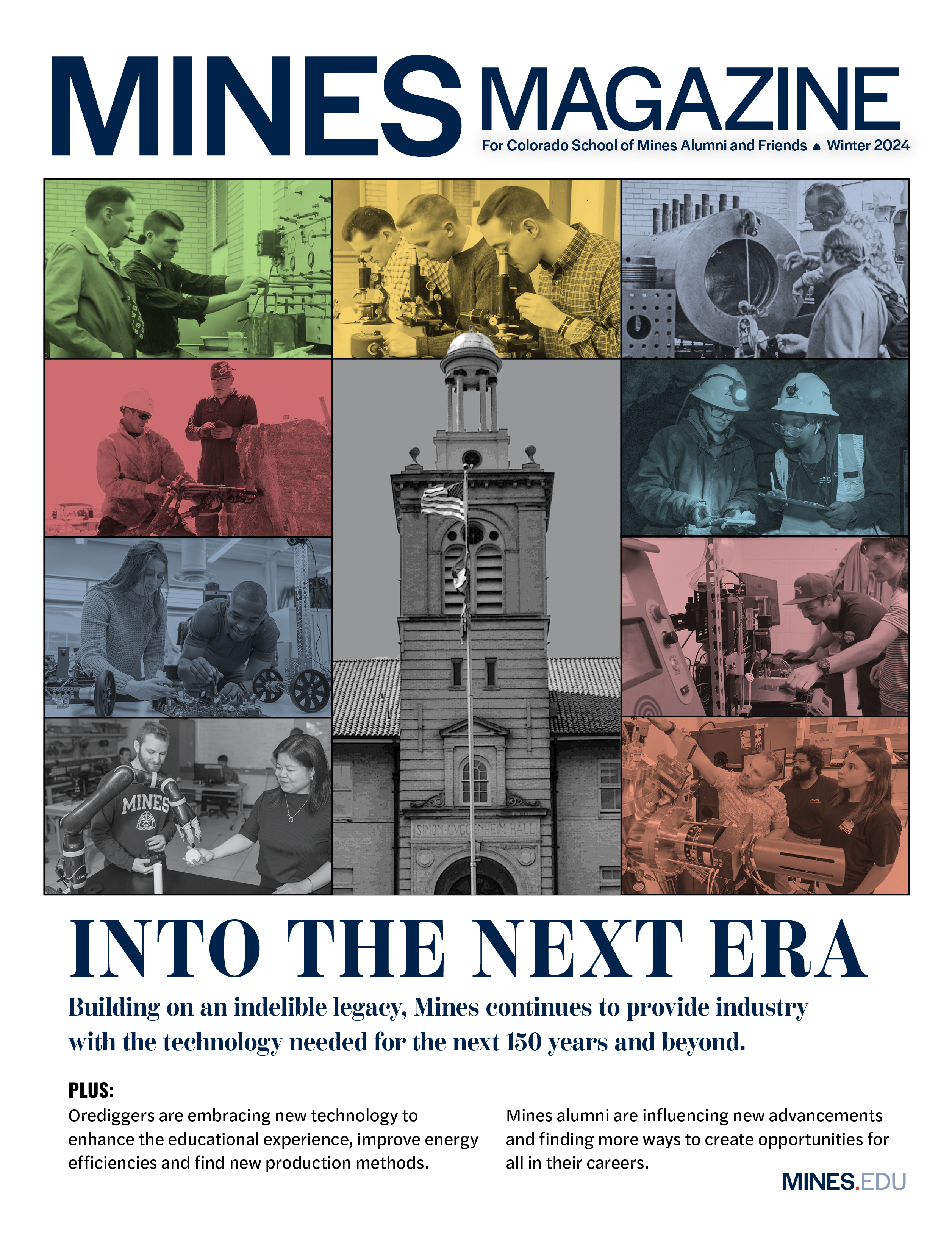 When Terry Fox ’89 tells groups of inner-city children to aim high, that with hard work and persistence they can achieve their most ambitious dreams, she speaks with more authority than most. She was recently sworn in as a judge of the Colorado Court of Appeals, one of the most influential legal positions in the state and a world removed from her childhood, growing up the daughter of a migrant farmworker.
When Terry Fox ’89 tells groups of inner-city children to aim high, that with hard work and persistence they can achieve their most ambitious dreams, she speaks with more authority than most. She was recently sworn in as a judge of the Colorado Court of Appeals, one of the most influential legal positions in the state and a world removed from her childhood, growing up the daughter of a migrant farmworker.
Moving constantly throughout her education, it wasn’t until Fox began her sophomore year of high school that she actually spent an entire academic year at one school. Nevertheless, she graduated salutatorian from Brighton High School, went on to earn a degree from Colorado School of Mines and, after attending Houston’s South Texas College of Law, launched a challenging and successful legal career. As part of a continuing focus on the accomplishments of alumni, Minesmagazine brings you this profile of Fox’s life and career.
Early years
Though she was born in the United States, she actually spent most of her first eight years living with her grandparents in Mexico. However, she then returned to the U.S. with her two sisters and her mother, who was determined to give her daughters an American education. Her father, who worked for a mine in Chihuahua, remained behind, Fox only saw him twice more before he died of a lung-related disease.
“We moved about every six months, through Colorado, New Mexico and Texas,” says Fox. Migrating with the harvests, every new location meant a new set of faces; there was never any real sense of community. “The place we stayed the most was just one room with a kitchen area and one bed that the whole family had to sleep on,” says Fox. “There was a toilet outside, but no shower facilities, so we’d bathe in a ‘tina’ or a large bucket, warming the bath water on the stove.”
Perpetually the newest girl in her class, she stopped trying to make friends with other students. Instead, she focused on academics. “I received positive reinforcement from my teachers and as long as my teachers were encouraging, I felt like school was a good place to be,” she explains.
In seventh grade, she competed with the school’s math team at the University of Texas at El Paso. “That’s the first time I ever saw a college campus,” says Fox, who was immediately entranced. “I asked a lot of questions: ‘What is this place, who lives here, why do they live here, and how do they get here?'” Her teacher, Harry Segapelli, told her, “Keep up the good grades, and you’ll find a way to get back here.”
“I ended up somewhere better, at Mines,” says Fox, “but he planted the seed.”
Leaving home
When she received the offer to attend Mines, her mother said she couldn’t go. “It’s so ironic,” Fox remarks. “She came to this country so I could be educated here, but then she felt that a high school education was good enough. She thought I belonged at home until it was time for me to marry. For my mother, my duty first and foremost was to my family, and taking a job at a local K-Mart was, to her, an improvement from our work in the fields.” Fox enrolled at Mines anyway. “We didn’t see eye to eye for some time,” she says.
Fox thrived at Mines. The first person in her family to attend college, she majored in chemical engineering and minored in public affairs through the McBride Honors Program. She was on the honor roll all four years; joined the honor society, Tau Beta Pi; and immersed herself in campus life, serving as president of the Society of Hispanic Professional Engineers and vice president for the Society of Women Engineers.
She also met her future husband, Jordan Fox ’89, another chemical engineering major. “We had all the same classes,” she says, adding that they were married almost immediately after graduation: “We graduated on a Friday and were married a week later.”
They both landed jobs in Houston, hers was with Vista Chemical, which is where she became curious about law. She spent a substantial amount of time with the company’s environmental lawyers: “The more I worked with them, the more I was intrigued by the regulatory scheme,” she says.
Law
As a way of exploring this interest without giving up her job with Vista, she began taking night classes at Houston’s South Texas College of Law before long she’d charted a new career path and was back at school full time. She was soon joined by Jordan, for whom law was already a career plan.

After remaining on the dean’s list three years and graduating in the top 5 percent of her class, Terry landed a prized yearlong clerkship with the Texas Supreme Court. When that ended in 1994, the couple relocated to Colorado, where Terry spent five years working for the natural resources department of Holland & Hart. Looking for courtroom experience, she then moved on to the Office of the Colorado Attorney General under Ken Salazar, where she jumped in at the deep end, a month after starting the job she was arguing a case in front of the Colorado Court of Appeals.
Two years later she moved to the Public Officials Unit of the office, where she and two other lawyers had responsibility for representing the governor, lieutenant governor, secretary of state, treasurer and attorney general, an interesting opportunity for a graduate of the McBride Honors Program. “This gave me an opportunity to defend officials who were engaged in creating public policy for our state,” she said.
It also gave her the opportunity to try cases in federal court, which, combined with her background in natural resources and her technical education, helped her secure a highly desirable post in 2004 at the U.S. Attorney’s Office for the District of Colorado. “This is probably one of the most desirable legal jobs in the state, maybe even the nation,” she says, when we spoke in December, shortly before she left the office. More than 800 applications were received for her job.
Reflections
There is a pattern to Fox’s career progression. She’s loved every job she’s ever had, but she keeps moving on. “I’ve always had this idea that once I get too comfortable with something, it’s probably a good time to take on a new challenge,” she says. Holland & Hart provided an introduction to the fundamentals of legal work, while her two subsequent positions have given her ample courtroom experience. So is her move to the State Court of Appeals similarly motivated?
The answer is yes and no. The scope and responsibility of the job are greater than anything she’s taken on to date, so in that respect it will be a stretch. At the same time, after living an extroverted life of a trial lawyer and a more cloistered existence as environmental counsel to corporations, she’s opted for a middle path: time in court listening to legal arguments and interacting with attorneys, but also solitary time to reflect on the law, weigh the merits of each case and draft opinions.
Can she imagine a day when she doesn’t feel challenged by her new job? “I don’t know if I’ll ever reach a comfort zone, because the work that a court of appeals judge does is so interesting and so varied. The legislature keeps changing statutes, so there’s always going to be a new challenge and a new interest.”
Looking back at her childhood, she can’t pinpoint qualities that predicted a legal career. “I could always see being an engineer,” she says. “If there’s a scientific aspect to a case, it keeps me really intrigued. I was always like that as a child. I was always interested in figuring things out, but I never knew that the law would be a career for me.”
Still in her mid-40s, Fox’s career progression has been rapid, which she partly attributes to good networking. “I’ve always been good at keeping good professional contacts,” she says. “If there was a job I was interested in, I let people know that if an opportunity ever came up, I’d be interested.” I asked her what she considers her greatest achievement, expecting her to say her appointment to the bench. I was wrong. “I think just the fact that I was the first in my family to attend and graduate from college,” she says. “It has opened so many doors for me.”
Perhaps in appreciation for the role Mines has played in her life, she served on the school’s board of trustees for almost two years before resigning in October 2010 when her appointment created the potential for conflict of interest. She gives back to her community in many other ways, including serving on the boards of the Colorado Supreme Court’s Bar Admissions Law Committee and Attorney Regulation Committee. In 2009 and 2010, she served on the Regional Selection Committee for the Truman Scholarship Foundation, and she is a member, and has served as a board member, of the Colorado Hispanic Bar Association.
She’s also frequently asked to speak: She’s delivered the keynote address at Mines’ Continuum Celebration that honors graduating women, and she’s delivered speeches to Colorado Youth at Risk and Manual Mentors Program.
She particularly welcomes opportunities to address disadvantaged youth, generally in the classroom, to whom she delivers different versions of the same message: “Just because you come from a humble background, you don’t have to limit yourself. If you are willing to work really hard, you can make it.”
It’s a message many young people would respond to with cynicism, but not when it comes from her. As she says, “I’m not just saying it. I’ve actually lived it.”
by Nick Sutcliffe



